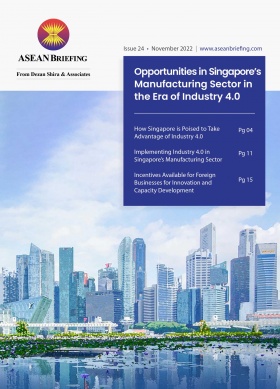A Guide to Taxation in Malaysia
Malaysia implements a territorial tax system with residents and non-residents taxed on their Malaysian source income.
Foreign investors in Malaysia are subject to the following major taxes:
- Corporate income tax;
- Value-added tax;
- Income tax; and
- Digital service tax.
Corporate tax
For resident and non-resident companies, corporate income tax (CIT) is imposed on income incurred in Malaysia.
The tax rates are the following:
|
Company type |
Chargeable income |
Tax rate (%) |
|
Resident company |
|
24 |
|
Resident company with paid up capital of 2.5 million ringgit (US$572,000) and gross income of less than 50 million ringgit (US$11.4 million) |
For the first 600,000 ringgit (US$137,000) |
17 |
|
Non-resident company |
|
24 |
Value-added tax
Malaysia replaced its Goods and Services Tax (GST) with the Sales and Services Tax (SST) regime in 2018. The sales tax rates are 10 percent, and the service tax rate is six percent. Some goods are taxed at a reduced rate of five percent.
The sales tax rate is levied on companies with taxable goods sales value exceeding 500,000 ringgit (US$114,000) in a 12-month period. The threshold for restaurants is 1.5 million ringgit (US$343,000). Businesses subject to the service tax rate include hotels, advertising, electricity, accounting services, and employment agencies.Withholding tax
The withholding tax only applies to non-resident companies or individuals who have sourced income from Malaysia.
|
Nature of income |
Tax rate (%) |
|
Dividends |
0 |
|
Interest |
15 (unless the rate is reduced under a tax treaty) |
|
Royalties |
10 |
|
Fees for onshore services/use of movable property |
10 |
Individual income tax
Malaysia uses both progressive and flat rates for personal income tax (PIT), depending on an individual’s duration and type of work in the country. As expatriates may fall into either tax category, it is important to understand Malaysia’s basic tax structure.
The Income Tax Act of 1967 structures personal income taxation in Malaysia, while the government’s annual budget can change the rates and variables for an individual’s taxation.Income tax rate amendments
Under Budget 2023, which has yet to be tabled, the government is expected to reduce the income tax rates for certain resident taxpayers.
|
Chargeable income |
YA 2022 |
YA 2023 |
|
|
% on excess |
% on excess |
|
5,000 ringgit (US$1,144) |
1 |
1 |
|
20,000 ringgit (US$4,578) |
3 |
3 |
|
35,000 ringgit (US$8,011) |
8 |
8 |
|
50,000 ringgit (US$11,445) |
13 |
11 |
|
70,000 ringgit (US$16,023) |
21 |
19 |
|
100,000 ringgit (US$22,891) |
24 |
24 |
|
250,000 ringgit (US$57,228) |
24.5 |
25 |
|
400,000 ringgit (US$81,562) |
25 |
25 |
|
600,000 ringgit (US$137,344) |
26 |
26 |
|
1,000,000 ringgit (US$228,907) |
28 |
28 |
|
2,000,000 ringgit (US$457,814) |
30 |
30 |
Special income tax rates for non-citizens holding key positions in companies
Non-citizen individuals who hold C-suite positions in companies looking to relocate to Malaysia can receive a flat income tax rate of 15 percent. To qualify, the individual must:
- Receive a monthly salary of not less than 25,000 ringgit (US$5,772);
- Hold the C-suite position for a period of five consecutive years; and
- Be a Malaysian tax resident for each year of assessment throughout the flat tax rate treatment.
Imposition of the prosperity tax
Also known as cukai makmur, companies with chargeable income of more than 100 million ringgit (US$22.8 million) must pay an additional nine percent in corporate income tax (CIT) in 2022. This means businesses will pay a total of 33 percent in CIT.
The government has stated that this ‘windfall tax’ would be a one-off initiative given the high-expenditure requirements of the government to tackle the pandemic.
Tax on income from outside of Malaysia
The Malaysian government has decided to provide a tax exemption on foreign-sourced income for individual taxpayers, backtracking from their earlier proposal made in the 2022 budget to tax Malaysian residents on their income sourced from abroad.
The categories of foreign-sourced income that are exempt from income tax are the following:
- Dividends received by companies and limited liability partnerships; and
- All types of income are received by individual taxpayers.
The income tax exemption is effective from January 1, 2022, until December 31, 2026.
Digital service tax
As of January 1, 2020, the Malaysian government has imposed a digital services tax (DST) of six percent on foreign digital service providers (FSPs) in Malaysia.
Defining digital services
The Royal Malaysian Customs Department (RMCD) guide defines digital services as any service that is subscribed to or delivered over the internet or other electronic networks with minimal human intervention from the service provider.
The guide provides a few examples of digital services which include:
- Online licensing of software;
- Firewalls;
- Mobile applications and video games;
- Provision of e-books, films, music, streaming services, and subscription-based media;
- Search engines and social networks;
- Website hosting services, cloud storage services;
- Online advertising platforms;
- Internet-based communications; and
- Online learning services.
The guide also defines FSPs as:
- A person who sells digital products to consumers in Malaysia;
- A person who sells digital products through intermediaries; or
- An online platform that sells digital products on behalf of an overseas provider.
Revenue threshold
Foreign digital service providers who have reached 500,000 ringgit (US$120,000) in annual turnover must register to collect and remit the six percent service tax. Applications for submission began on October 1, 2019.
Registered FSPs must issue invoices and file tax returns on a quarterly basis, ending on the last day of any month of any calendar year.
Defining consumers
The RMCD guide defines a consumer as any business or individual that fulfills any two of the following criteria:
- Makes payment to an FSP through a credit card or debit facility provided by a financial institution under the country’s Ministry of Finance;
- Resides in Malaysia; or
- Acquires the digital service through an internet protocol (IP) address registered in Malaysia.
To determine whether the consumer resides in Malaysia, the guide advises FRPs to consider:
- The consumer’s billing address in Malaysia; and
- The consumer’s home address is in Malaysia.
About Us
ASEAN Briefing is produced by Dezan Shira & Associates. The firm assists foreign investors throughout Asia and maintains offices throughout ASEAN, including in Singapore, Hanoi, Ho Chi Minh City, and Da Nang in Vietnam, Munich, and Essen in Germany, Boston, and Salt Lake City in the United States, Milan, Conegliano, and Udine in Italy, in addition to Jakarta, and Batam in Indonesia. We also have partner firms in Malaysia, Bangladesh, the Philippines, and Thailand as well as our practices in China and India. Please contact us at asia@dezshira.com or visit our website at www.dezshira.com.
- Previous Article Singapore and South Korea Sign Digital Trade Agreement
- Next Article Philippines Opens Renewable Energy to Full Foreign Ownership







